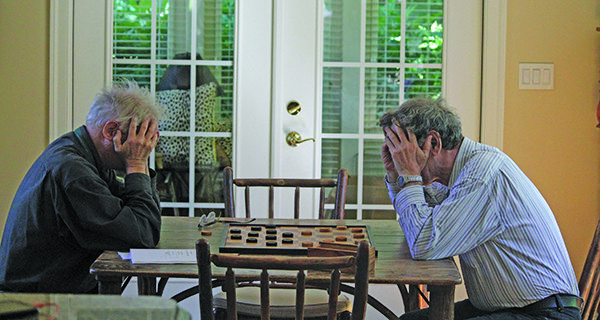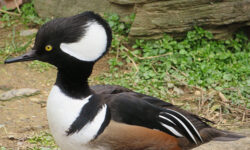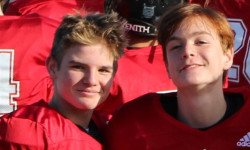[ccfic caption-text format="plaintext"]
By James Kinneen
Hometown Weekly Reporter
Checkers gets a bad rap.
While Bond movies show their newest villain is a genius by having him play chess, and grandmasters like Bobby Fischer and Garry Kasparov became legitimate celebrities for their mastery of the game, people think of checkers as an easy game, barely above tic-tac-toe, or a game for people too dumb to play chess. In fact, when someone is outsmarting his or her competition, it’s common to hear they’re “playing chess, while everybody else is playing checkers.”
But don’t say that around the people competing in the American Checkers Federation’s New England Championship.
Held on Saturday, June 8, in the Medfield home of Catherine and Richard White, the tournament was open to any challenger that thought they had a shot. Both former presidents of the Dickinson College chess club, Richard began seriously studying checkers when Catherine began beating him at it, and the two quickly realized how in-depth the game truly is. Eventually, Richard began competing around the state and they began hosting the New England Championships.
“We would play checkers and I tended to win, so he started to wonder about that,” Catherine explained. “He started to study the game to find out what is there to this, that there’s a consistent winner and loser, so as he started to study the game, he got involved with playing it competitively. We’ve always had space because I owned an investment management company, so we could have it there. Then we had it at our house in Dover and now we’re in Medfield.”
Initially playing correspondence checkers via postcard, Richard much prefers playing face-to-face rather than over the internet. But, while he hosts the tournament, he doesn’t dominate it. In fact, going into this year’s round-robin, the same player was champion or co-champion since 2011. That player was Westwood’s Joseph Margolin.
Margolin explained that he originally played Russian checkers, a variant where kings can move like bishops in chess, among other differences. After moving to American checkers in around 1983, Margolin also discovered the complexity of the game was far different from what the public believes.
“People think it’s a children’s game, but it’s not,” he commented. “Its’ a precise game with lots of calculations, but for some reason, they think ‘it’s only checkers, it’s no big deal, I move to the left or right.’ The rules are simple but the strategy, the sacrifices - it’s not easy to comprehend.”
In trying to explain how checkers can be so difficult when there are so few options, Richard White cited grandmaster Marion Tinsley’s horizon versus well metaphor.
“Tinsley said: ‘chess is like looking over a big field with a long horizon, whereas checkers is like looking down a deep well.’ The reason being, with chess, in any given position, you probably have six or so moves that are plausible. With checkers, maybe it’s only one or two. So, it’s not the range of possibilities, but it’s how far ahead you can see. Some of the classic endgames don’t resolve for forty moves or so.”
Catherine White opted to compare “easy” versus simple, noting, “It’s not easier, it’s simpler, which is quite different. ‘Go’ is simpler than ‘Chutes and Ladders’ - that doesn’t mean it’s easier.”
She also noted an odd myth that going first in checkers means you’re automatically going to win.
She invited anyone that wants to test that theory to come to the tournament and see how it works out.
Before Margolin’s dominance, Mike Magnelli was the man to beat. He won every tournament from 2003-2007, before kind of disappearing from the tournament. Eventually, one of the tournament players found him on an online checkers site and reached out to him. He returned from the abyss this year to challenge Margolin, in a very Fischer-Spassky showdown.
Unfortunately for both men, this year belonged to Richard White and Steve Kelly. Margolin would place second, with Fred Follis, Mike Magnelli, Steve Catanese, Eric Reid and John Hanagan rounding out the top eight.
While no cash prize was awarded, the winners’ names will be etched onto a plaque and they will have the bragging rights of knowing they’re the best checkers player in New England.
And for those who know how complex a game checkers actually is, that’s something to brag about.











